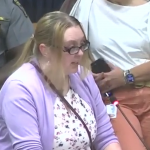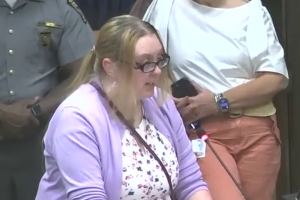
The United Auto Workers are throwing their weight behind Dan Osborn, a Nebraska labor leader running as an independent against incumbent Republican Sen. Deb Fischer — propelling a campaign that is mounting an unexpected challenge for office in a state that has become a Republican stronghold in the past two decades.
“We need candidates like Dan who aren’t afraid to be an independent voice for the working class in the halls of power,” UAW President Shawn Fain said in a statement. “It isn’t about your political party; it’s about taking the fight against corporate greed to Washington DC. As a union member, Dan knows all about that fight, and we’ve got his back.”
Osborn launched his challenge against 73-year-old Fischer less than a year ago. Since then, the two polls available have shown that the race is competitive. Several election forecasters predict Republicans netting at least 50 Senate seats in November — with Nebraska being an assumed win; Osborn’s candidacy may put a wrench in that.
A poll conducted in November had Osborn, a 48-year-old military veteran, leading Fischer by a slim margin of 2 percentage points; in response to a question describing both Osborn’s and Fischer’s backgrounds, 50 percent of respondents said they’d vote for Osborn, while only 32 percent said they’d vote for Fischer. The same poll had former President Donald Trump leading President Joe Biden by a margin of 16.
Another poll conducted in late April showed Osborn trailing Fischer by 4 percentage points, with 30 percent of voters undecided. Sixty percent of respondents said Fischer’s support for a national abortion ban with no exceptions for rape or incest made them less likely to vote for her. That poll had Trump leading Biden by a wider 23-point margin (Trump beat Biden by 19.1 points in 2020).
The UAW — which last year led a historic and successful strike campaign against all Big Three automakers and has subsequently launched a campaign to unionize 150,000 more workers at car plants across the country — lauded Osborn as being part of that tradition. The 400,000-strong labor organization noted in its endorsement statement that Osborn helped lead the 2021 strikes at food giant Kellogg’s, “which saw the end of a two-tier wage system — something UAW has fought hard for in past strikes, too.”
Union endorsements typically lead to campaign donations from the union’s PAC but can also unlock heavier support in the form of independent expenditure ads or ground-level canvassing campaigns.
Osborn’s platform includes legalizing marijuana, confronting agricultural monopolies, passing the Protecting the Right to Organize Act, and opposing “extreme national measures to ban abortion.” Osborn also calls to reform the rail industry by requiring two-person crews, increasing rail safety violation fines, and guaranteeing rail workers seven days of paid sick leave — reforms pursued by Democrats and a handful of self-proclaimed pro-worker Republicans after the Norfolk Southern derailment in East Palestine, Ohio last year.
Osborn has ruffled some feathers in the state by refusing to accept the endorsement of either major party. State Democratic officials initially considered supporting Osborn’s candidacy and did not field a Democratic candidate against him in the primaries. But when Osborn announced, just one day after the state primaries, that he would not accept the party’s endorsement, the state Democratic Party published a statement saying that Osborn “betrayed” their trust. The party said that it intended to field a write-in candidate against Osborn and Fischer for the general election; that effort has not yet materialized.
“This campaign is about standing up to the corruption and political games of both parties in Washington that have left working people behind,” Osborn said in a statement to The Intercept. “With our brothers and sisters in the labor movement behind us, we are building a movement of working people to send someone to Washington who will fight for our interests, not the interests of a political party or a politician or a huge corporation that bankrolls campaigns.”
When Osborn launched his campaign last year, he outlined an aspirational coalition of supporters outside of the party infrastructure. “I will bring together workers, farmers, ranchers, and small business owners across Nebraska around bread-and-butter issues that appeal across party lines,” Osborn said. He has pledged not to accept any corporate backing for his campaign.
Osborn is the clear underdog in the money race against Fischer. The campaign says it has raised over $1.3 million (financial records up through April 24 show over $800,000 raised), with top donations coming from individual donors and labor unions. Fischer’s campaign, meanwhile, has raised over $3.5 million as of April 24. Fischer’s largest donations have come from the campaigns of fellow Republican Sens. John Cornyn, R-Texas, and John Thune, R-S.D.; Republican congressional PACs; and AIPAC, which has donated nearly $250,000 this cycle.
But Osborn had secured endorsements from several labor organizations before the UAW weighed in, including the United Steelworkers, International Association of Machinists and Aerospace Workers, Communications Workers of America, Nebraska State AFL-CIO, United Food and Commercial Workers, and more.
Osborn’s candidacy could force Republicans to send resources to a state they otherwise would not have budgeted much additional expenditure for. While Republicans eye potential pickup opportunities in West Virginia, Montana, and Ohio — states that went to Trump in 2020 — and seek to push in Wisconsin, Pennsylvania, Nevada, and Arizona, they now have to account for a seat that otherwise would have been considered safe.









